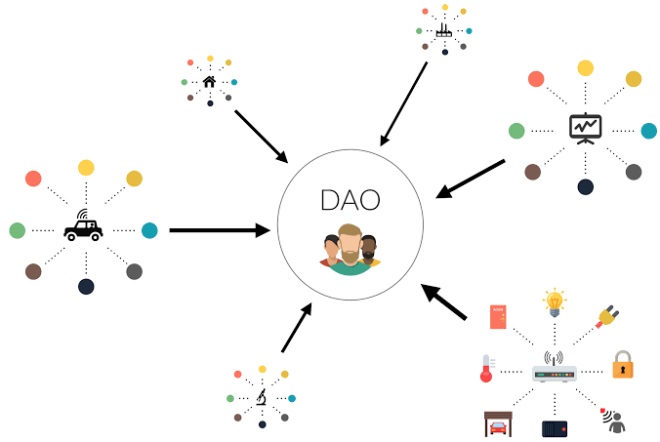
DAO, or decentralized autonomous organization, is a new way of organizing and collaborating with people around the world. Unlike traditional organizations, which have a central authority or hierarchy, a DAO is governed by its members through a set of rules encoded in smart contracts on a blockchain. This means that anyone can join a DAO, participate in its decision-making process, and benefit from its collective actions, without having to trust or rely on any intermediaries.
DAOs are important because they enable new forms of social and economic coordination that are more transparent, democratic, and efficient than existing models. DAOs can empower communities to pursue shared goals and values, such as funding public goods, creating digital art, supporting social causes, or building innovative products and services. DAOs can also reduce the costs and risks of collaboration, such as bureaucracy, corruption, censorship, or fraud, by leveraging the security and immutability of blockchain technology.
The core of a DAO is its smart contract, which defines the rules of the organization and holds its funds. The smart contract is deployed on a blockchain, such as Ethereum, which ensures that the rules are enforced, and the funds are secure. The smart contract also allows the members of the DAO to vote on proposals and actions that affect the organization, such as allocating resources, changing parameters, or updating the code. The voting process is transparent and verifiable by anyone on the blockchain.
Register for Tekedia Mini-MBA edition 19 (Feb 9 – May 2, 2026): big discounts for early bird.
Tekedia AI in Business Masterclass opens registrations.
Join Tekedia Capital Syndicate and co-invest in great global startups.
Register for Tekedia AI Lab: From Technical Design to Deployment (next edition begins Jan 24 2026).
Some examples of DAOs are:
The DAO, one of the first and most famous DAOs, which was created in 2016 to automate decisions and facilitate cryptocurrency transactions. However, it was hacked and drained of millions of dollars due to a vulnerability in its code.
MakerDAO, a DAO that manages a decentralized lending platform and a stablecoin called DAI. MakerDAO allows users to borrow DAI by locking up collateral in smart contracts and adjusts the interest rates and parameters through a governance token called MKR.
MetaCartel, a DAO that funds and supports projects in the Ethereum ecosystem that focus on user experience, adoption, and social impact. MetaCartel uses a token called METACARTEL to coordinate its members and distribute grants.
DAOs are still an emerging and experimental phenomenon, and they face many challenges and opportunities in their development. Some of the challenges include:
Security: DAOs need to ensure that their smart contracts are bug-free and resistant to attacks, as any flaw or exploit could compromise their funds or functionality.
Scalability: DAOs need to find ways to handle large numbers of members and transactions without sacrificing performance or security, as blockchain networks have limited capacity and high fees.
Regulation: DAOs need to navigate the legal and regulatory implications of their activities, as they may not fit into existing frameworks or jurisdictions.
Culture: DAOs need to foster a culture of trust, cooperation, and accountability among their members, as they rely on collective intelligence and self-organization.
Some of the opportunities include:
Innovation: DAOs can enable new forms of innovation and value creation that are not possible or feasible in traditional organizations, such as crowdsourcing, crowdfunding, co-creation, or co-ownership.
Inclusion: DAOs can enable more people to participate in and benefit from economic and social activities that are otherwise inaccessible or exclusive, such as investing, lending, donating, or voting.
Impact: DAOs can enable more effective and efficient solutions to global challenges that require collective action and coordination, such as climate change, poverty, or health.
DAOs are a revolutionary concept that has the potential to transform how we organize and collaborate with each other. By leveraging blockchain technology and smart contracts, DAOs can create decentralized organizations that are more transparent, democratic, and efficient than existing models.
However, DAOs also face many challenges and opportunities in their development, as they need to overcome technical, legal, cultural, and ethical issues. As more people experiment with and participate in DAOs, we may witness the emergence of a new paradigm of social and economic coordination.



